- Home
- Grace Callaway
The Return of the Duke Page 17
The Return of the Duke Read online
Page 17
So Fancy did. Starting from her encounter with Knighton at the stream to the camping at the farmhouse to her sleepwalking in the storm. She told her best friend about how good, kind, and noble Knight had been toward her. And she revealed the terms of their marriage: that the one thing Knight wasn’t offering was love.
“Hold up,” Bea said with a frown. “You, Fancy Sheridan, life-long believer in faerie tales, married a man who wants nothing to do with love?”
“It’s not as bad as it sounds.” Seeing her friend’s skepticism, Fancy added quickly, “Knight is a kind and generous ’usband. Why, this afternoon I’m to go shopping with ’is Aunt Esther, and ’e’s given me,”—she tried to recall the phrase—“carte blanche. It means I can buy whate’er I want.”
“I know what it means.” A line formed between Bea brows. “And I also know that you don’t give a whit about gowns and gewgaws. Haven’t you always told me that nothing is more important than love? What you want—what you’ve always wanted—is a husband you love and who loves you in return.”
It was true. That had been her dream, always.
It still is, her heart whispered.
“I ’aven’t given up on my dream. I think…I think I’m falling in love with ’im, Bea.” She swallowed against rising despair. “But ’is ’eart belongs to another, and I met ’er this morning. She looks like an angel.”
To her horror, her voice broke, heat pushing behind her eyes. The tears fell before she could stop them, and once they started, they wouldn’t stop.
Bea put an arm around her shoulders, murmuring, “There, there, dear. Let it all out.”
Fancy did, and when she was done, Bea handed her a handkerchief. “Feel better?”
“Yes.” Sniffling, she wiped her eyes. “I ’aven’t ’ad anyone to talk to about this.”
“That’s what bosom chums are for,” Bea said. “Now tell me about this ‘angel’ you met.”
Not wanting to betray Knight’s confidence, Fancy kept the details to a minimum, enough so that her friend could understand the situation.
“’Er name is Imogen, and ’e’s loved ’er since ’e saved ’er from a runaway carriage when ’e was fifteen. But she’s a lady, and ’e wasn’t grand enough back then to win ’er family’s approval. She married an earl five years ago and,”—Fancy’s breath hitched—“Knight still loves ’er.”
“He told you this?” Bea asked.
Fancy blew her nose and nodded. “’E said loving ’er was a ’abit ’e couldn’t break. ’E was being ’onest with me, see, because ’e wanted me to understand the kind o’ marriage ’e was offering.”
“A marriage of convenience?” Bea murmured.
“’E didn’t call it that, exactly. ’E said that while ’e couldn’t give me love, ’e would be true and take care o’ me. That we would ’elp each other and be a team.”
“How are things in the marital bower?”
Heat flooded Fancy’s cheeks.
Bea laughed. “You don’t need to answer me, dearest: your blush says it all. I’m not surprised, really, given the way Knighton looks at you.”
“’Ow does he look at me?”
“How do I describe it?” Bea tilted her head. “Like you’re a deer and he’s a starved wolf?”
“Oh.” She widened her eyes. “You think so?”
“I noticed it even before I left for London. While Knighton was busy convincing himself that he had a duty to propose to me, he couldn’t keep his eyes off you. That was why I warned you before I left. I was worried that he might propose something untoward, but instead…” A smile slowly spread across Bea’s face. “Instead he’s done the right thing and made you a duchess.”
“I want to be the lady Knight needs me to be,” she said earnestly, “one ’e’ll be proud to ’ave on ’is arm. I want to ’elp ’im with ’is siblings too—who, by the by, make my brothers look like perfect princes. I didn’t tell you all o’ it, but Knight’s road ’asn’t been an easy one. ’E’s ne’er ’ad anybody to lean on, not really, and I want ’im to know ’e ain’t alone now.”
As she spoke her thoughts aloud, her resolve grew. She could never be the angelic Imogen, but Knight wasn’t married to Imogen, was he? He was married to her, Fancy, and she didn’t come to this marriage empty-handed. She was her father’s daughter: what tinkers lacked in wealth and prestige, they made up for in grit, determination, and adaptability.
Why, how many times had she mended a broken pot or piece of clothing? Or taken things she’d found in a rubbish pile and turned them into objects others would pay good money for? She would use all the skills at her disposal to become what Knight needed.
She would simply fix…herself.
I’ll be what ’e needs, she thought fiercely. I’ll make myself o’er into a lady. I’ll work to win my prince’s ’eart.
“You are what your husband needs.” Bea reached over and squeezed her hand. “You are beautiful, loving, and sweet, which is probably what drew Knighton to you in the first place.”
Fancy was too busy planning to pay full attention to her friend’s words.
“Aunt Esther will ’elp me with my clothes and ’air,” she said eagerly. “She says I must ’ave lessons as well.”
Bea pursed her lips. “Lessons in what?”
“In everything. She says I must learn to speak, dress, and act like a lady.” Fancy looked hopefully at her friend. “Would you mind ’elping me with…” She tried to recall Aunt Esther’s term. “Proper comportment?”
“I’m hardly a shining example of propriety,” Bea said dryly. “But I would be glad to point you in the general direction.”
“Thank you.” Bubbling with enthusiasm, Fancy suddenly realized there was something she had not yet mentioned. “And there’s something else. A secret about my past.”
She shared what Da had revealed about her origins.
“Goodness.” Bea’s lavender gaze rounded. “And there were no other clues about who your parents might be, other than the clothing you were wearing and the note?”
“None whatsoe’er. Da thinks—and Knight and I agree—that at least one o’ my parents must ’ave been rich.” She bit her lip. “Maybe a lady gave birth to me out o’ wedlock, or I’m some toff’s by-blow. Whate’er the case, they needed to be rid o’ me.”
Concern lined Bea’s brow. “Is it safe for you to be in London?”
“It’s been o’er two decades since that note was written. ’Ow could I be in danger now?” She shrugged. “But Knight says I’m not to take risks, and ’e won’t let me go anywhere without an escort.”
“I like your duke better already,” Bea murmured.
“’E’s a good man,” she said staunchly. “And I’m going to make myself into a lady worthy o’ ’im.”
“That is utter claptrap.”
At her chum’s sharp tone, Fancy blinked.
“I’ve been around so-called ladies all my life, Fancy,” Bea went on. “After I was scarred, they turned their backs on me, even those who professed to be my closest friends. None of them showed your goodness, loyalty, or heart. Any man who deserves you will see that: will see you for the jewel that you are.”
Fancy was touched by her friend’s words. Yet if she were a jewel, she would be a diamond in the rough compared to the sparkling perfection of Imogen, Countess of Cardiff. Being born a duke’s daughter, Bea didn’t understand certain things…and perhaps couldn’t. Even when the winds of Fate had been cruel, she’d had wealth and privilege to buffer her.
Not having those things, Fancy would have to rely on her skills to win her husband’s heart.
“Even a jewel needs the right setting and polishing up,” she said lightly. “Speaking o’ which, Aunt Esther is taking me shopping this afternoon.”
“I wish I could come with you,” Bea said, “but Wick is taking me to look at rings.”
The glow of happiness on Bea’s face warmed Fancy inside and out. They moved on to discuss the plans for Bea’s wedding ceremony, and
Fancy offered to help however she could. Listening to her once-jaded chum wax on about flowers and decorations, she felt her resolve and courage strengthen.
Love was everything, and she would fight for it in her own marriage.
21
That afternoon, Fancy followed Aunt Esther into a shop on Bond Street. The establishment’s exclusivity was such that its name was not advertised. There was only a discreet sign in the window that read, “By Appointment Only.”
The sparkling plate glass windows and royal blue awning piped with gold set the tone for the elegantly spartan interior. Gleaming rosewood counters and cabinets lined the shop’s perimeter. Chairs upholstered in dark blue velvet were clustered next to small tables laid with gilt-rimmed teacups.
“Bienvenue, ladies.” A dressmaker’s assistant came to greet them with a diffident curtsy. “Madame Rousseau is finishing up with a client and will be with you shortly. Please have a seat.”
Following Aunt Esther’s lead, Fancy settled into one of the chairs, and before long they had tea and a plate of bite-sized pastries to enjoy as they waited.
Fancy peered at her surroundings with awe. “This is a grand shop, ain’t it?”
“It is an exclusive establishment.” Aunt Esther’s blue-grey eyes were stern over the rim of teacup. “Elocution and grammar lessons begin tomorrow morning, but you might as well start reforming your speech now, Francesca.”
“Yes, ma’am.” Fancy didn’t mind being corrected; as far as she was concerned, she needed all the help she could get to become a lady. “I’ll try my best to speak proper-like.”
“Properly. And don’t try, gel.” Aunt Esther sipped her tea. “Simply do it.”
“Yes, aunt.” Lowering her voice, Fancy said, “Do you think Madame Rousseau will be able to ’elp me look like a duchess?”
“Madame Rousseau is the most sought after modiste in London. Her patrons represent the crème de la crème of Society and include royalty.” Aunt Esther did not whisper. “If she cannot help you, no one can. She only accepts clients by referral, and it takes months to get a booking with her. You are only getting in because I am giving you my appointment.”
“That is kind o’ you,” Fancy said earnestly. “I appreciate everything you’re doing for me.”
Aunt Esther set down her cup. “I am not doing it for you, gel. I am doing it for the family.”
“I know. But I’m still grateful for your ’elp. And for all you’ve done for Knight.”
“What do you know about that?” the lady asked, her thin black brows arching.
“I know that you championed ’im when a cousin contested ’is legitimacy and right to the title. I know you supported ’im when you could ’ave looked the other way. And I know that you’re one o’ the few people in Knight’s life who ’as stood up for ’im,” Fancy said with trembling sincerity. “For that, you’ll ’ave my gratitude always.”
“Knighton told you this?” Aunt Esther looked astonished. “He said that I championed him?”
He had not said that in so many words. But Fancy knew that he felt it.
She recalled how solitary Knight had seemed when they first met. And the way he had kept himself apart from her family and the Taylors, not because he was a snob but because, she suspected, he simply did not know how to be part of a family. She thought of his wry comments about his siblings’ dislike of him and his stark resignation when that introductory meeting had gone awry. Her heart squeezing, she resolved to help him patch things up with his family…starting now.
“’E might not express ’is appreciation aloud,” she said. “Knight ain’t a gentleman who discusses ’is feelings—”
“As is proper for a gentleman,” Aunt Esther said with an approving nod.
“But I know ’e appreciates all you’ve done for ’im, ’is siblings, and me. Since ’e grew up with only ’is mama, I think ’e never ’ad much o’ a family, which makes ’im value ’aving one now all the more,” Fancy mused.
“Well.” Aunt Esther cleared her throat. “I would not have guessed it. But, as you say, Knighton is not a man to air his laundry, which is a sign of good breeding. You can tell me these things, Francesca, but mind you don’t wag your tongue like an untrained puppy when we’re out in Society. Best to keep matters in the family, do you understand? The Knighton name is never to be tarnished.”
“Yes, Aunt Esther,” she said.
She could see that reticence ran in the Knighton blood. Yet as Aunt Esther took a sip of tea, indicating the conversation was over, Fancy saw a glimmer of longing in the other’s eyes. Her intuition told her the lady’s blade-sharp tongue shielded a softer core. After all, Lady Brambley had outlived her husband, parents, and her siblings, and she had no children of her own. Such an existence must be lonely. Maybe she needed a family as much as Knight did.
A door opened at the back of the shop, and Fancy saw a woman emerging. While short of stature, the lady possessed a regal bearing and wore a bonnet with pink ostrich feathers that increased her vertical presence considerably. Her face was angular, with a hawkishness to her nose and dark eyes. Her steel-colored curls placed her in her fifties or sixties. The woman who held the door for her was thin, with dark silver-threaded hair, her immaculate black gown identifying her as the dressmaker. A maid followed diffidently in the stately lady’s footsteps.
To Fancy’s surprise, Aunt Esther surged to her feet, gesturing to Fancy to follow suit.
“Your Royal Highness,” Aunt Esther said with a deep curtsy. “What an honor to see you.”
Fancy hastily dipped her knees and bowed her head as well.
“Lady Brambley.” The woman had an aristocratic accent that sounded…German? The imperiousness of her voice made Fancy keep her head ducked. “And who do you have with you there?”
“May I present to you my nephew’s wife Francesca, the Duchess of Knighton? Francesca, you have the honor of being introduced to Her Royal Highness, Princess Adelaide of Hessenstein.”
“I am pleased to make your acquaintance, Your Royal ’Ighness,” Fancy blurted to the lady’s embroidered shoes.
“A duchess, eh? Well, let’s have a look at you.”
At the command, Fancy slowly raised her head. She saw something flash through the princess’s hooded gaze, and her heartbeat stuttered. Blooming hell, she didn’t look that terrible, did she? She knew her gown wasn’t the nicest, but the maid had managed to tame her hair into a creditable topknot. As Princess Adelaide continued to peruse her, looking at her as if she were some vile thing the cat dragged in, Fancy’s stomach churned, her mortification growing.
Why couldn’t I ’ave met ’er after I got new dresses and a few lessons under my belt? she thought miserably.
Fancy wanted so badly to be a duchess who would make Knight proud, the sort who could glide into any room with poise and grace. Instead, she’d fallen flat on her face on her very first outing. And she’d done so in front of royalty, no less. It was a nightmare coming true.
“Her Grace is newly arrived in London, Your Royal Highness.” Aunt Esther’s apologetic tones cut through Fancy’s spiraling thoughts. “She is not yet accustomed to Town ways, but rest assured, I shall be offering my guidance.”
“How fortunate for her.” Princess Adelaide pinned Fancy with piercing eyes. “Where are you from, Your Grace?”
“Um, ’ere and there,” Fancy said weakly.
“Here and there?” The princess’s gaze narrowed. “What sort of an answer is that?”
“My family travels, Your ’Ighness.” She swallowed. “My da is a tinker.”
“A tinker, you say?” Princess Adelaide’s brows shot ceilingward. “How extraordinary of Knighton to marry into a family of travelling peddlers.”
As mortified as Fancy was, she did not like the woman’s scornful tone. It was one thing to insult her and another to insult her family who’d done nothing to deserve it.
She pulled her shoulders back. “My da isn’t a peddler. ’E’s a tinker and gifted at ’is trad
e, Your ’Ighness.”
“Well, that is not saying much, is it?”
“The name Milton Sheridan is famous in some parts for if ’e can’t mend it, nobody can,” she said through gritted teeth.
“I have never heard of him.”
The princess’s haughty dismissal of Da provoked Fancy into replying, “If you ’ad, you would know that ’e’s known equally for ’is tinkering and for ’is good ’eart, and that I can speak to personally. If ’e and my ma ’adn’t taken me in when I was a babe, I wouldn’t be standing in front o’ you today, and that’s a fact.”
Aunt Esther gasped, quickly covering the sound with a cough. Fancy’s heart thumped with anger and fear as the princess regarded her for several long moments.
“You have pride,” Princess Adelaide declared.
Fancy blinked.
“That will serve you well in your new life, Your Grace.” She raked Fancy over with another assessing glance before turning to Aunt Esther. “Lady Brambley, you may bring her to my next monthly salon.”
“How very kind of you, Your Royal Highness.”
Aunt Esther sounded as shocked as Fancy felt. She curtsied, and at her sharp nudge, Fancy followed suit. Princess Adelaide inclined her head and walked out, her maid scampering behind her.
Once the door was closed, Aunt Esther expelled a breath. “That was a near disaster.”
Shame clogging her throat, Fancy clasped her hands. “I’m sorry, Aunt Esther. I know I shouldn’t ’ave—”
“You have no cause to be sorry, gel,” Aunt Esther interrupted. “You just snatched victory from the jaws of defeat…in a manner worthy of Wellington himself! Princess Adelaide is one of the most fashionable hostesses in Society; a word from her can make or break a reputation. Do you know how difficult it is to secure an invitation to Her Royal Highness’s monthly salons?”
“No,” Fancy said truthfully. “Is it difficult?”
“More difficult than getting an appointment with Madame Rousseau. Is that not so, Madame?”
Aunt Esther turned to the dressmaker, who’d been standing there, Fancy realized, discreetly observing all the while. Madame Rousseau had a handsome face and intelligent eyes that gave the impression of missing little.

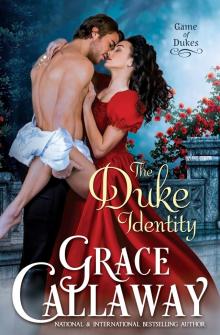 The Duke Identity: Game of Dukes, Book 1
The Duke Identity: Game of Dukes, Book 1 The Return of the Duke
The Return of the Duke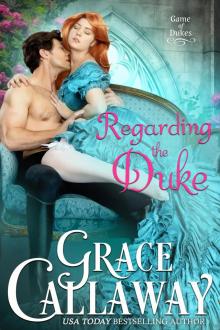 Regarding the Duke
Regarding the Duke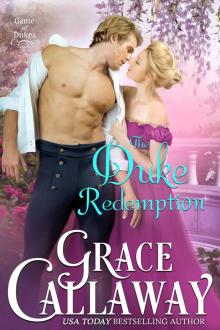 The Duke Redemption
The Duke Redemption Olivia and the Masked Duke
Olivia and the Masked Duke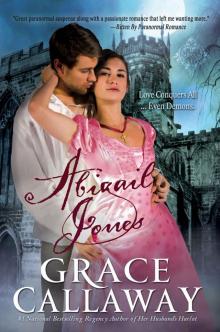 Abigail Jones (Chronicles of Abigail Jones #1)
Abigail Jones (Chronicles of Abigail Jones #1)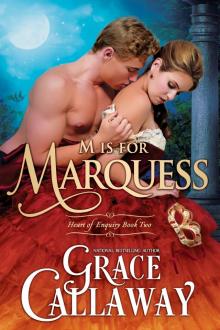 M Is for Marquess
M Is for Marquess Her Husband's Harlot
Her Husband's Harlot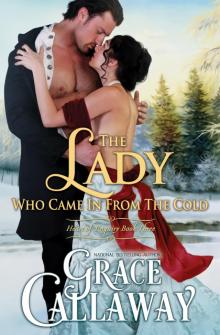 The Lady Who Came in from the Cold
The Lady Who Came in from the Cold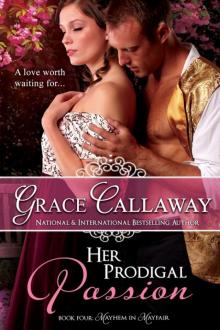 Her Prodigal Passion
Her Prodigal Passion The Widow Vanishes
The Widow Vanishes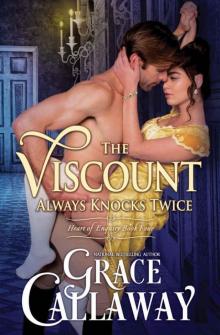 The Viscount Always Knocks Twice (Heart of Enquiry Book 4)
The Viscount Always Knocks Twice (Heart of Enquiry Book 4)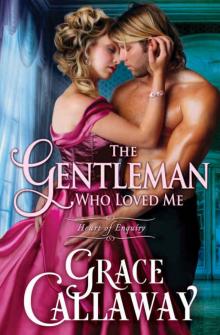 The Gentleman Who Loved Me (Heart of Enquiry Book 6)
The Gentleman Who Loved Me (Heart of Enquiry Book 6)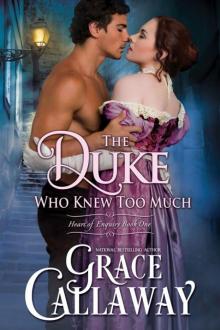 The Duke Who Knew Too Much
The Duke Who Knew Too Much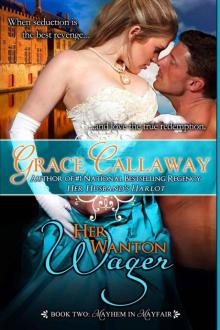 Her Wanton Wager
Her Wanton Wager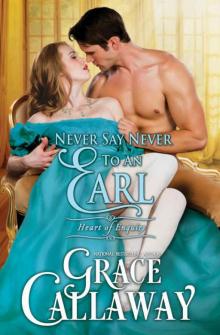 Never Say Never to an Earl (Heart of Enquiry Book 5)
Never Say Never to an Earl (Heart of Enquiry Book 5)